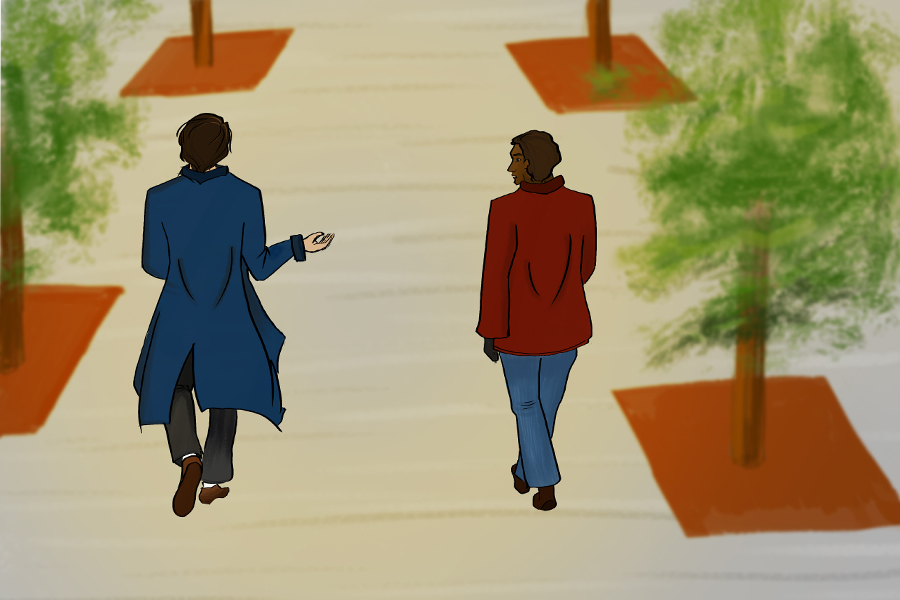Alone, together: Substance abuse recovery organizations take community online
April 14, 2020
Like other local substance abuse recovery organizations, PEER Services has made many of its in-person counseling programs virtual, operating online and over the phone. But executive director Maureen McDonnell said many low-income clients pay for phone calls by the minute — and the price of a call can quickly add up.
“They’re prioritizing every day how they’re spending those minutes, and they don’t necessarily want to have an hour counseling session if they have to pay by the minute,” McDonnell said. “We’re still working that out.”
Alongside barriers to access, COVID-19 and social distancing create a number of challenges for those recovering from substance abuse. Obstacles include fear, isolation and detachment from others in recovery.
In addition to its outpatient counseling services, PEER Services runs a methadone clinic from its Evanston location. Methadone helps individuals with opioid use disorders reduce their dependence on the drug, and it stabilizes the brain and nervous system.
Patients normally visit the clinic daily to receive methadone doses. But to enable social distancing, McDonnell said her organization is asking some patients to come to the center for detoxification treatments less frequently.
“We have to make a medical decision person by person about how safe it is to give them an extra day of medication,” McDonnell said. “There’s a balance between managing the person’s opiate use disorder and their risk of getting coronavirus.”
After the services at Doreen E. Chapman Center at Evanston Hospital became virtual, medical director Laura Parise said the center’s had difficulty monitoring outpatients who are using detoxification treatments. As a result, she said she has referred people with medical risk factors to inpatient programs more frequently than she did before the pandemic.
For her patients continuing outpatient recovery, Parise said a quick transition to online programming was crucial.
“When you’re trying to get sober, you’re very vulnerable,” Parise said. “People can easily relapse with an interruption in treatment.”
Tom Ross, an Evanston therapist who works predominantly with people involved in Alcoholics Anonymous, said the program depends on personal relationships between participants to facilitate community healing. While the program remains respectful of individuals’ boundaries, Ross said AA is often a physical experience, with participants holding each other’s hands and hugging.
For longtime AA members, Ross said the transition to online meetings is unpleasant but manageable. However, he said new members can feel isolated without face-to-face programming.
“One client did, unfortunately, relapse,” he said. “He didn’t have that support system cemented for him. When you’re in recovery, you’re replacing substances with people in the program, essentially. If you don’t have a solid foundation in the people, the program and the community, you’re really vulnerable to relapsing.”
New AA members often receive sponsors, or one-on-one mentors to help them through recovery. Ross said now, most pairs are communicating through text to build their relationships. Some of his clients, he said, have met up with their sponsors to take walks at a distance. It’s the next-best alternative to physical connection, he said.
He added that group members are finding new ways to connect. When AA members reach recovery milestones, they receive tokens that mark their progress. One of Ross’ clients recently hit his 30-day mark after collecting most of his days on Zoom.
“Some guy from the meeting found out, asked him where he lived, and if (the member) would be comfortable with him bringing his coin over,” Ross said. “He brought his 30-day coin over, and put it in the mailbox for him.”
Evanston substance abuse therapist Roberto Amato said he sees the pandemic as an opportunity for healing.
While the pandemic can induce fear, he said, it also presents a window for growth.
“People are having the opportunity to redesign themselves,” Amato said. “If they are interested in taking the opportunity, they are halfway there. We just need to help them to feel empowered, to have the courage to be imperfect.”
McDonnell said after the 2008 economic recession, PEER Services saw a spike in people seeking mental health and substance abuse treatment.
She anticipates a similar burst will occur after the pandemic ends.
“Right now, when everyone’s in a different situation, it might be hard for people to see the choices they’re making and how it’s impacting them,” McDonnell said. “It might not be until we go back to normal, whatever that is, that people are like, ‘Oh, okay. All right. I’ve got to do something about this.’”
People seeking support for substance use disorders can seek help through their primary care doctor, therapist or psychiatrist, and they can contact the sources named in this article. Additionally, they can access resources on the Illinois Department of Human Services and the Substance Abuse and Mental Health Services Administration web pages.
Email: maiaspoto2023@u.northwestern.edu
Twitter: @maia_spoto
Related stories:
—‘We see real miracles here’: local groups tackle opioid addiction
— Opioid crisis panel discusses addiction, collaboration


